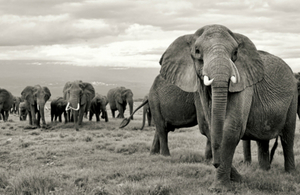Introduction of ivory bill boosts fight against elephant poaching
The Ivory Bill introduced to Parliament today will be the toughest in Europe - and one of the toughest in the world.

(Photo credit: Thinkstock)
One of the toughest bans on ivory sales in the world is a step closer to coming into force in the UK as the Government today (23 May 2018) introduced the Ivory Bill.
The introduction of this Bill means that robust measures set out last month by Environment Secretary Michael Gove are a step closer to becoming law, and helping to protect elephants for future generations.
The Bill covers ivory items of all ages, not only those produced after a certain date, subject to some narrow, carefully-defined exemptions. The maximum penalty for breaching the ban will be an unlimited fine or up to five years in jail.
The Bill follows widespread engagement with environmental groups and the antiques trade sector as well as the general public. More than 70,000 people and organisations responded to Defra’s consultation on an ivory ban late last year, with over 88% of responses in favour of measures to ban ivory sales in the UK.
The number of elephants has declined by almost a third in the last decade and around 20,000 a year are still being slaughtered because of the global demand for ivory. The UK Government continues to show global leadership in this area and in October will play host to leaders from across the globe at the fourth international conference on the illegal wildlife trade.
Environment Secretary, Michael Gove said:
Elephants are one of the world’s most iconic animals and we must do all we can to protect them for future generations. That’s why we will introduce one of the world’s toughest bans on ivory sales. The overwhelmingly positive response to our consultation shows the strength of public feeling to protect these magnificent animals.
We have acted quickly in introducing this Bill, less than six weeks after publishing our consultation responses. I hope this serves as a clear sign of our global leadership on this vital issue.
As announced in April’s consultation response, the Bill provides for narrowly-defined and carefully-targeted exemptions for items which do not contribute directly or indirectly to the poaching of elephants:
-
Items with only a small amount of ivory. Such items must be comprised of less than 10% ivory by volume and have been made prior to 1947
-
Musical instruments. These must have an ivory content of less than 20% and have been made prior to 1975
-
The rarest and most important items of their type. Items of outstanding artistic, cultural or historic significance, and made prior to 1918 Such items will be assessed by specialists at institutions such as the UK’s most prestigious museums
-
Sales to and between accredited museums. This applies museums accredited by Arts Council England, the Welsh Government, Museums and Galleries Scotland or the Northern Ireland Museums Council in the UK, or the International Council of Museums outside the UK
-
Portrait miniatures. A specific exemption for portrait miniatures – which were often painted on thin slivers of ivory – made before 1918
The combination of the UK’s ban on ivory items of all ages with these exemptions delivers one of the toughest ivory bans in the world. The US federal ban has a rolling exemption for items over 100 years, as well as items with up to 50% ivory content. China’s ban exempts ivory “relics”, but this term is not clearly defined.
Charlie Mayhew MBE, Founder and CEO of Tusk Trust said:
We very much welcome the speed with which the Government has moved to introduce this important bill. The public response to the consultation demonstrated that there is overwhelming support for this tough new legislation to ban the trade in ivory in the UK.
This bill will ensure that as the Government prepares to host the next international conference on the illegal wildlife trade in October, the UK will once again be taking a global lead on closing ivory markets that have resulted in the decimation of hundreds of thousands of elephants over recent years. We trust that Parliament will move equally swiftly to pass the bill into law.
Tanya Steele, Chief Executive at WWF said:
Every day we lose around 55 African elephants, slaughtered for their ivory. If we want to ensure this majestic animal still roams a generation from now, we must shut down domestic ivory markets around the world.
The London Illegal Wildlife Trade Conference this October can be a catalyst for that, but progress towards a UK ban is essential if we are to persuade other countries to take action. It’s great to see this Bill being introduced to the Commons, and we hope it now passes speedily through Parliament to become law.
John Stephenson, Stop Ivory CEO said:
We welcome this speedy introduction of the legislation to end ivory sales in the UK. The pace at which important proposals are being underscored by legislation is a welcome and important contribution to ending the scourge of poaching and securing a sustainable future for elephants.
Hopefully the remainder of the EU will now follow the UK’s lead without further delay and implement the changes that their populations have been demanding.
As profits become ever greater, the illegal wildlife trade has become a transnational organised enterprise, estimated to be worth up to £17billion a year.
In October, the UK will show global leadership in this fight when it hosts the fourth international conference on the illegal wildlife trade. The event will bring global leaders to London to tackle the strategic challenges of the trade. This follows the ground breaking London 2014 conference on the illegal wildlife trade, and subsequent conferences in Botswana and Vietnam.
Updates to this page
-
Added a supportive quote from a stakeholder
-
added in stakeholder quotes and photo credit
-
First published.